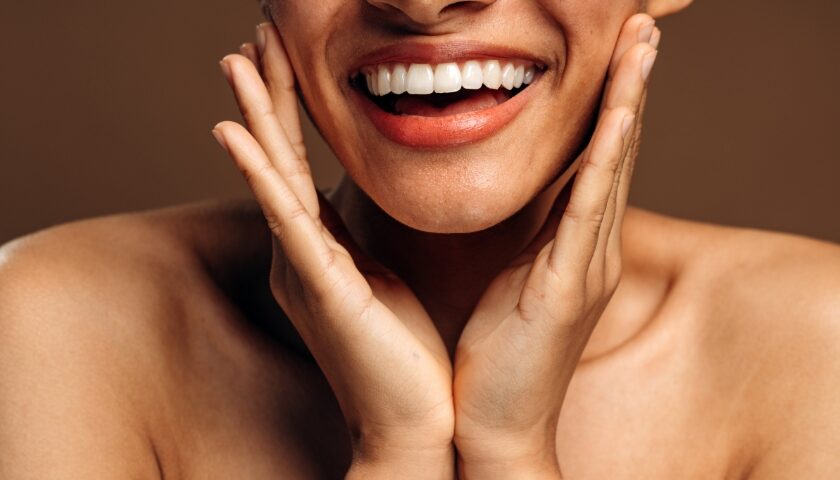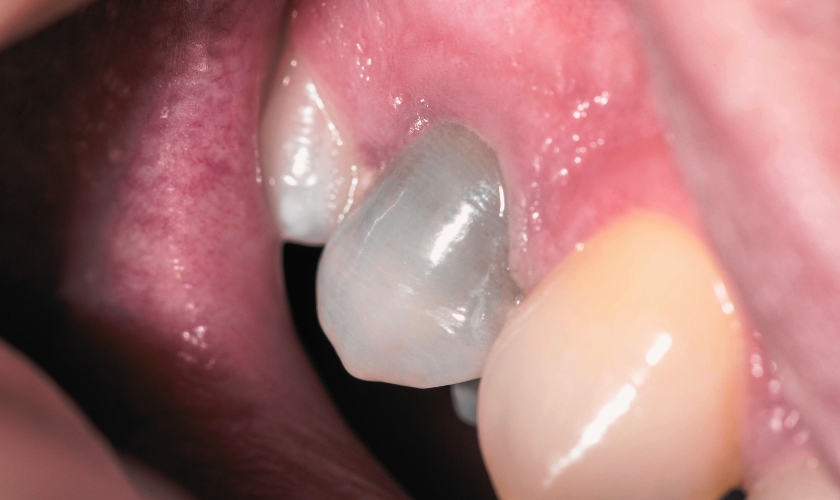Turmeric Teeth Whitening: Does This Ancient Spice Whiten Teeth?

Can Natural Antibiotics Fight Tooth Infections?
July 7, 2024
Dry Mouth: Causes and Treatment
July 23, 2024Ever wondered what makes your smile a little less than dazzling? Teeth stains are a common concern, and the desire for a brighter smile has led to a booming teeth whitening industry. But before diving into the world of DIY solutions like turmeric, let’s understand the science behind teeth stains and explore different whitening methods.
What Causes Teeth Stains?
There are two main types of teeth stains:
- Extrinsic stains: These are surface stains caused by external factors like:
- Chromogens: Pigmented compounds found in coffee, tea, red wine, and certain fruits.
- Fluorosis: Excessive fluoride exposure during childhood can cause white mottling on teeth.
- Smoking and tobacco use: Leave behind dark, tarry stains.
Intrinsic stains: These deeper stains originate within the tooth itself due to:
- Certain medications: Antibiotics like tetracycline can stain developing teeth.
- Trauma or injury: Can damage the tooth’s pulp, leading to discoloration.
- Excessive fluoride exposure: In adults, it can cause brown spots.
Understanding the type of stain you have is crucial for choosing the most effective whitening method.
Different Teeth Whitening Methods
There’s a range of options for achieving a whiter smile, from readily available drugstore products to professional treatments performed by dentists. Here’s a breakdown:
At-home whitening:
- Whitening toothpaste: Contains mild abrasives and chemicals to remove surface stains.
- Whitening strips: Adhesive strips coated with a bleaching agent like hydrogen peroxide.
- Whitening trays: Custom-fitted trays filled with a whitening gel for overnight wear.
Professional whitening:
- In-office whitening: A dentist applies a concentrated bleaching agent followed by a special light to activate it.
- Take-home whitening kits: These kits are provided by a dentist and involve custom trays and a higher concentration of whitening gel for at-home use.
Important Note: Always consult your Olds dentist before starting any at-home whitening treatment, especially if you have sensitive teeth, existing dental work, or gum disease.
Importance of Safe Teeth Whitening Practices
Not all whitening methods are created equal. Here’s why safe practices matter:
- Overuse of whitening products: Can damage tooth enamel and lead to tooth sensitivity.
- Harsh abrasives: Found in some whitening toothpaste, they can wear down enamel.
- Improper use of bleaching agents: Can irritate gums and cause mouth sores.
It’s essential to choose gentle yet effective methods and follow instructions carefully. Now, let’s delve into the world of turmeric and explore its potential for teeth whitening.
Unveiling Turmeric: A Natural Wonder
Turmeric, a vibrant golden spice with a rich history in traditional medicine, has become a popular ingredient in DIY beauty trends. But can this ancient wonder truly whiten teeth? Let’s explore its properties and potential benefits for oral health.
A. Historical Use of Turmeric for Medicinal Purposes
For centuries, turmeric has been revered in Eastern cultures for its medicinal properties. Used in Ayurveda, a traditional Indian system of medicine, turmeric boasts anti-inflammatory and antiseptic qualities.
B. Scientific Properties of Turmeric Relevant to Teeth Whitening
The magic behind turmeric’s potential health benefits lies in a compound called curcumin. Curcumin possesses:
- Antioxidant properties: May help combat free radical damage in the mouth.
- Anti-inflammatory properties: May reduce gum inflammation associated with gingivitis.
- Antimicrobial properties: It May help fight bacteria that contribute to plaque buildup.
While these properties are promising for overall oral health, the question remains: can turmeric whiten teeth?
C. Potential Benefits of Turmeric for Overall Oral Health
Turmeric offers a range of potential benefits for your oral health, even if the effects of teeth whitening are debatable. These include:
- Reducing inflammation: May help manage gingivitis, a gum disease characterized by inflamed gums.
- Fighting bacteria: This may help combat the growth of harmful bacteria that contribute to plaque buildup.
- Promoting wound healing: This may aid in the healing of minor mouth sores.
Important Note: While turmeric offers potential benefits, it’s not a substitute for proper oral hygiene practices like brushing, flossing, and regular dental checkups.
Can Turmeric Whiten Teeth? Separating Fact from Fiction
Turmeric’s bright color might lead some to believe it can whiten teeth. However, the truth is a bit more complex. Let’s separate fact from fiction regarding turmeric’s teeth-whitening abilities.
A. Studies and Research on the Effectiveness of Turmeric for Teeth Whitening
There’s currently a lack of scientific studies directly investigating turmeric’s effectiveness in teeth whitening. Most available information is anecdotal or based on traditional uses.
B. Why Turmeric Might Not Be as Effective as Advertised
Several factors contribute to the uncertainty surrounding turmeric’s whitening power:
- Limited Bleaching Properties: Curcumin, while possessing various beneficial properties, doesn’t have strong bleaching capabilities like hydrogen peroxide, a common ingredient in whitening products.
- Staining Potential: Ironically, turmeric’s vibrant color can actually stain teeth temporarily. While brushing removes surface stains, frequent use might cause yellowing.
C. Potential Risks and Side Effects of Using Turmeric for Teeth Whitening
While generally considered safe, using turmeric for teeth whitening comes with potential downsides:
- Enamel Abrasion: Homemade turmeric pastes often lack the controlled abrasives found in whitening toothpastes. This can lead to enamel erosion if used excessively.
- Gum Sensitivity: Turmeric can irritate sensitive gums, causing discomfort.
Exploring Alternatives: Safe and Effective Teeth Whitening Options
Achieving a whiter smile is possible with a variety of safe and effective methods. Here are some alternatives to consider:
A. Brushing with Baking Soda (with Caution)
Baking soda is a mild abrasive that can help remove surface stains. However, it’s crucial to use it sparingly:
- Mix a small amount of baking soda with water to form a paste.
- Brush gently for no more than one minute, one to two times a week.
- Baking soda can be too abrasive for daily use.
B. Using Hydrogen Peroxide-Based Whitening Products
Hydrogen peroxide is a common bleaching agent found in many over-the-counter whitening products, including:
- Whitening toothpaste: These offer mild whitening effects through regular use.
- Whitening strips: Adhesive strips coated with hydrogen peroxide provide noticeable whitening results in a few weeks.
- Whitening trays: Custom-fitted trays filled with a hydrogen peroxide gel offer more concentrated whitening for at-home use.
Important Note: Always follow the manufacturer’s instructions for safe and effective use.
C. Professional Teeth Whitening Treatments (in-office & at-home kits)
For the most dramatic whitening results, professional treatments offered by dentists are the gold standard:
- In-office whitening: A dentist applies a concentrated bleaching agent followed by a special light to achieve significant whitening in a single visit.
- Take-home whitening kits: These kits are provided by a dentist and involve custom trays and a higher concentration of whitening gel for gradual whitening at home.
While professional treatments are more expensive, they offer the safest and most effective way to whiten teeth.
Remember, consulting your dentist near you before starting any whitening treatment is essential to ensure it’s safe and suitable for your individual needs.
Final Thoughts
Turmeric, while a fascinating spice with potential oral health benefits, lacks the scientific backing to be considered a reliable teeth whitening method in Olds, AB. Its staining properties and abrasive nature in homemade pastes can even be counterproductive.
For safe and effective teeth whitening, consider:
- At-home options: Explore hydrogen peroxide-based whitening toothpaste, strips, or trays with your dentist’s guidance.
- Professional treatments: In-office whitening or dentist-provided take-home kits offer the most dramatic and long-lasting results.
Remember, a healthy, bright smile starts with good oral hygiene practices like brushing, flossing, and regular dental checkups.
Consult your Olds dentist to discuss the best whitening options for your individual needs and achieve a dazzling smile that’s both safe and effective.
Frequently Asked Questions
Turmeric is generally safe for consumption and topical use in moderation. However, using it for teeth whitening comes with potential risks like enamel abrasion and gum sensitivity, especially in homemade pastes.
There’s no scientific evidence to support turmeric’s effectiveness in whitening teeth. Claims of rapid whitening with turmeric are likely unfounded.
Excessive use of homemade turmeric pastes can cause enamel erosion due to their abrasive nature.




